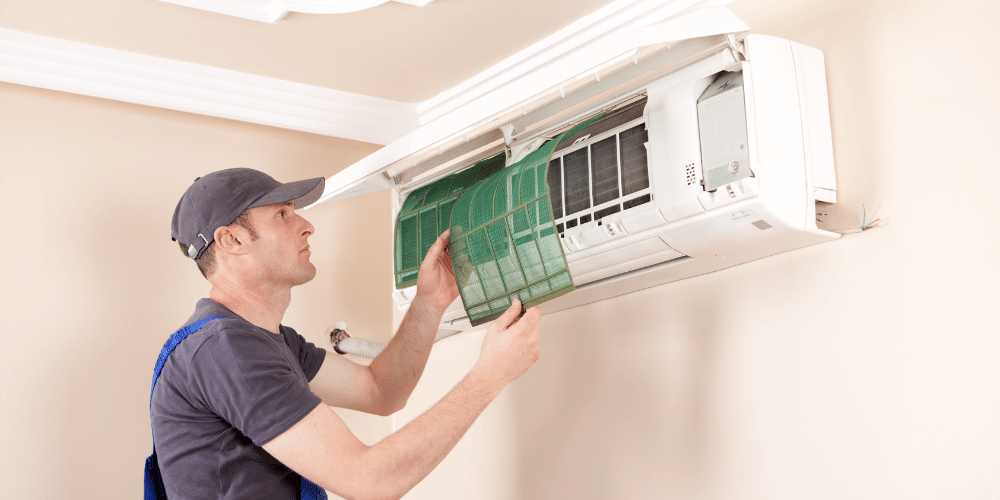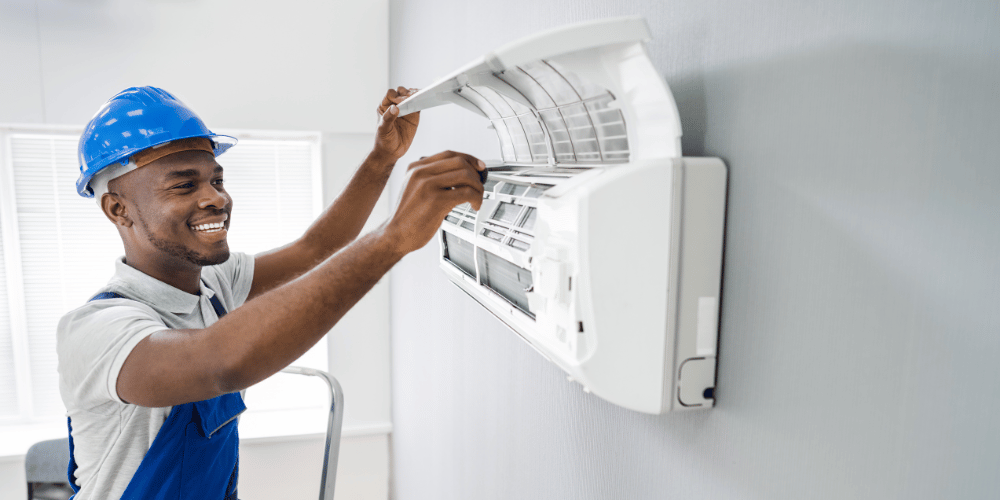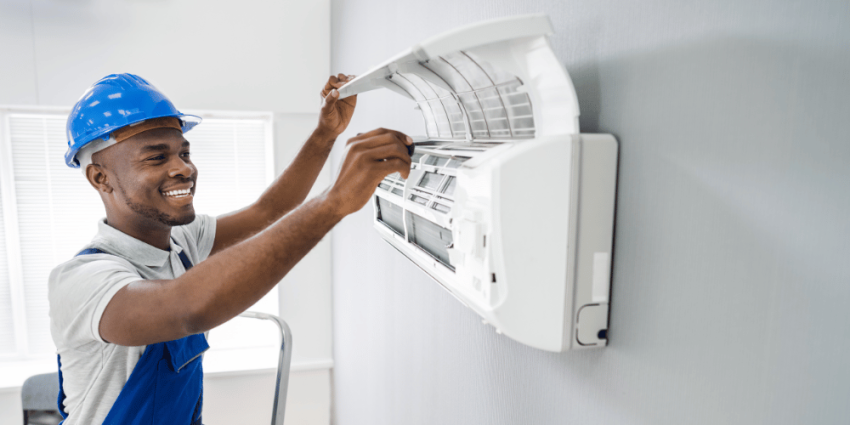Freezing up air conditioners is a common issue that homeowners encounter during the hot summer months. Not only can this cause your system to operate erratically, but it can also lead to costly repairs if left unchecked. But what exactly causes an air conditioner to freeze up? In this blog post, we explore the possible culprits behind frozen A/C units and how you can prevent it from happening in the future. From clogged filters to low refrigerant levels and more, read on to find out why your air conditioner might be freezing up and what you can do about it.
The air conditioner’s evaporator coils are usually the first to freeze up
There are a few different reasons why your air conditioner’s evaporator coils might freeze up. One possibility is that the coils are dirty and need to be cleaned. Another possibility is that the air conditioner is low on refrigerant. When an air conditioner is low on refrigerant, it can’t cool the air properly, and this can cause the coils to freeze up.
If your air conditioner’s coils have frozen up, you’ll need to thaw them out before using the air conditioner again. You can do this by turning off the air conditioner and letting it thaw for a few hours. Once the coils have thawed out, you should check to see if the air conditioner is low on refrigerant. If it is, you’ll need to add more refrigerant.

A clogged air filter can restrict airflow and cause the evaporator coils to freeze
A clogged air filter can restrict airflow and cause the evaporator coils to freeze. The evaporator coils are what remove heat from the air in your home, so when they get too cold, they can’t do their job properly. This can lead to your air conditioner working overtime to try to cool your home, which can use up a lot of energy and run up your electric bill.
Low refrigerant levels can also cause the evaporator coils to freeze
There are a few different reasons that your air conditioner’s evaporator coils may freeze up. One reason is if the air conditioner is low on refrigerant. When the air conditioner is low on refrigerant, it can’t properly cool down the air that passes over the evaporator coils. This causes the temperature of the coils to drop below freezing, and ice will start to form on them.
Another reason the evaporator coils may freeze is if there is something blocking the airflow to them. This could be something as simple as a dirty air filter or a more serious problem like a blockage in the ductwork. If the airflow to the coils is restricted, it can cause the temperature of the coils to drop below freezing and ice will start to form on them.
Lastly, if the thermostat is set too low, it can cause the evaporator coils to freeze. The thermostat controls how much coolant flows through the coils, so if it’s set too low, not enough coolant will flow through and the coils will get too cold. Ice will then start to form on them.
If you think your air conditioner’s evaporator coils are frozen, it’s important to turn off your unit and call a professional for help. Trying to fix this problem yourself could make it worse and lead to expensive repairs.
When to call a professional for help
If your air conditioner has frozen up, it’s important to call a professional for help. A professional will be able to diagnose the problem and make the necessary repairs.
You should call a professional if:
– The air conditioner is making strange noises
– The air conditioner is not blowing cold air
– The air conditioner is leaking water
– The air conditioner is cycling on and off frequently
How does an air conditioner work?
An air conditioner works by drawing heat out of the air in your home and transferring it to the outdoors. In order to do this, the air conditioner has a refrigerant that absorbs heat from the indoor air and then releases it outside. The process of absorbing and releasing heat is what makes your air conditioner cold.
One common reason why an air conditioner may freeze up is if the outdoor temperature is too cold. If the temperature outside is below 60 degrees Fahrenheit, the refrigerant in your air conditioner can start to freeze. Another reason why your air conditioner may freeze up is if there is not enough airflow over the coils. This can happen if the filter is dirty or if the coils are blocked by dust or dirt. If your air conditioner freezes up, you should turn it off and call a professional to service it.
What are some common causes of an air conditioner freezing up?
There are a few reasons why your air conditioner might freeze up. One common reason is if the air conditioner is low on Freon. Freon is a refrigerant that helps remove heat from the air, and when it’s low, the air conditioner can’t work properly. Another reason for an air conditioner to freeze up is if the evaporator coil or outdoor condenser coil gets dirty. These coils need to be clean in order for the air conditioner to work properly. If they’re Dirty, the air conditioner will have to work harder to cool the air, which can cause it to freeze up. Lastly, if the airflow around the evaporator coil is restricted, it can cause the coil to freeze. This usually happens when there’s something blocking the airflow, like a dirty filter or debris in front of the unit.
How can you prevent your air conditioner from freezing up?
As temperatures outside begin to rise, you may be thinking about firing up your air conditioner for the first time in months. But before you do, it’s important to make sure that your AC unit is in good working order—otherwise, it could freeze up.
A frozen air conditioner is not only ineffective at cooling your home, but it can also lead to serious damage to the unit. Fortunately, there are a few things you can do to prevent your air conditioner from freezing up:
1. Check the outdoor unit. Make sure that there is nothing blocking the airflow around the outdoor unit, such as leaves or debris. If the unit is obstructed, clear away any obstructions and ensure that there is at least two feet of clearance on all sides.
2. Inspect the coils. The coils inside the air conditioner are responsible for transferring heat. If they are dirty or damaged, they will be less effective at doing their job—which can cause the unit to freeze up. Clean the coils with a brush or cloth, and be sure to replace any damaged coils.
3. Replace the filter. A dirty filter can restrict airflow and cause the air conditioner to work harder than necessary—leading to a freeze-up. Replace the filter according to the manufacturer’s recommendations (usually once every one or two months).
4. Check for leaks. Leaks in the ductwork or around seals can allow coolant to escape, resulting in a drop in pressure. Low pressure can cause the air conditioner to freeze up, so inspect your system for any signs of leaks and get them repaired as soon as possible.
5. Schedule regular maintenance. The best way to keep your air conditioner running smoothly and free from freezing is to have it serviced regularly by a qualified HVAC technician. They will be able to identify any potential issues before they become serious problems, helping you avoid an inconvenient (and expensive) freeze-up.

What should you do if your air conditioner does freeze up?
If your air conditioner freezes up, there are a few things you can do to try and fix the issue. First, check the thermostat to make sure it is set to “cool” and not “heat.” If it is set to heat, switch it to cool and see if that fixes the problem. If not, turn off the unit and unplug it from the wall. Next, remove any ice or frost that has built up on the coils using a soft brush or cloth. Once the coils are clear, plug the unit back in and turn it on. If it still does not work, call a professional for help.
Conclusion
In conclusion, an air conditioner can freeze up due to a number of different causes. It is important to inspect your system regularly, and if you notice any signs that it might be freezing or not running properly, contact a professional right away. Air conditioning professionals will be able to diagnose the issue quickly and get your system back in working order so that you can stay comfortable all summer long.










Leave a Reply